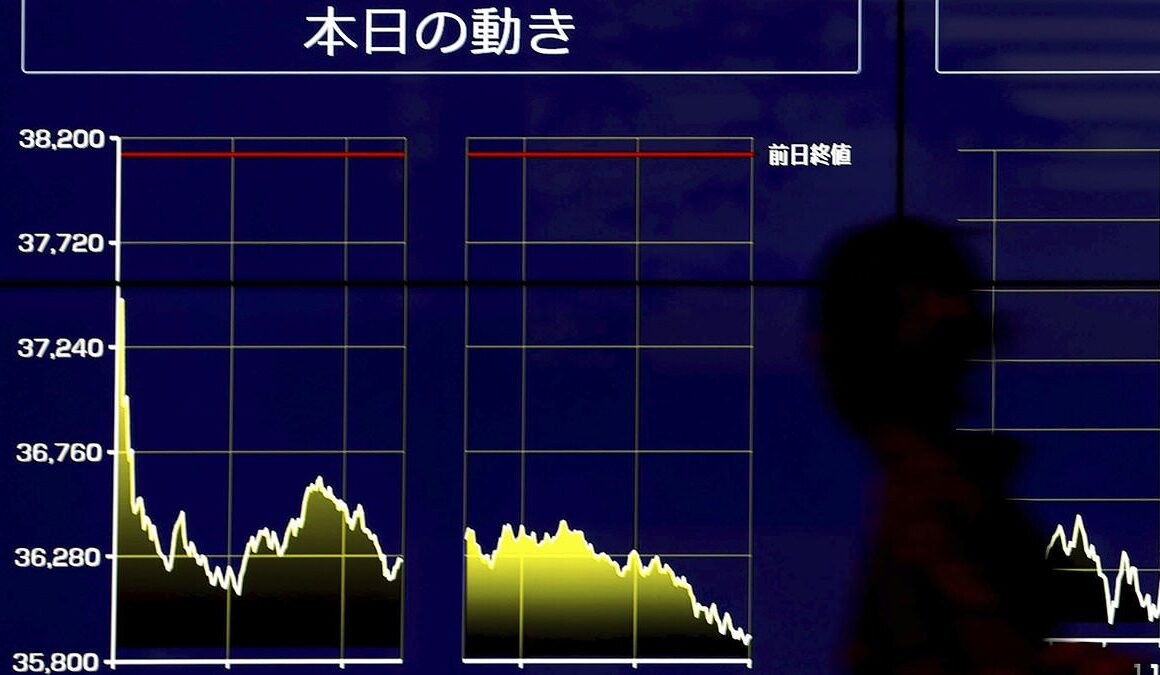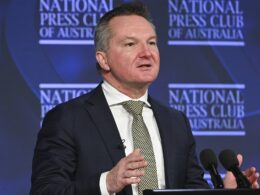Stock markets around the globe have continued to plunge on Monday amid fears the US economy may be on track for a recession as Japan suffered its worst sell-off since ‘Black Monday’ in 1987.
Experts at investment bank Goldman Sachs said they now believed there was a staggering 25 per cent chance of a recession in the US – up ten percent from their previous estimate of 15 per cent, while JP Morgan put the chances of a recession at 50 per cent.
US stock index futures tumbled on Monday, with those tied to the Nasdaq falling nearly 4 per cent, but traders are now ramping up bets that the Federal Reserve will announce an emergency interest rate cut in response to the global stock market crash and to avoid a huge recession.
The sell-off followed the release of a dismal unemployment report last week.
Employers added just 114,000 jobs last month, according to Labor Department data released Friday, far below the Dow Jones estimate of 185,000.



The benchmark Nikkei 225 index suffered its largest points drop in history, plunging 12.40%, or 4,451.28 points, to 31,458.42 as the broader Topix index lost 12.23%, or 310.45 points, to 2,227.15
The figure was the weakest since December last year and the second weakest since the start of the Covid pandemic in March 2020.
Robert Carnell, from financial services firm ING, said: ‘What we are looking at now is a situation where the market is viewing what’s going on in the US macro economy as ticking the recession box.’
The unemployment rate also edged higher to 4.3 percent – the highest level since October 2021.
The benchmark Nikkei 225 index in Tokyo – the third largest in the world – crashed by 12 per cent this morning, the biggest single-day fall in almost four decades, while South Korea‘s Kospi fell by nine per cent.
Markets in London, France, Singapore, Indonesia, Thailand, and the Philippines also fell by around two-and-three percent which prompted the triggering of circuit breakers – where the trading of stocks is paused for 20 minutes.
It comes after the US Federal reserve on Wednesday decided not to slash interest rates from the 5.25 per cent to 5.5 per cent range which they have been frozen since July last year.
Investors have shared concerns that the Federal Reserve may have left it too late to support the fragile US economy, warning that a US recession would cause chaos within other economies around the globe.
It would also spark mayhem during the upcoming November election, given the supreme importance of the economy to voters.
It could turn the race between Donald Trump and Kamala Harris strongly in favor of Trump as the blame for the economic mess would be pinned on Harris and Joe Biden.
A rate cut would make it easier for US households and companies to borrow money and boost the economy, but it could take months to a year for the full effects to filter through.
However, Goldman Sachs’ economists, led by Jan Hatzius, said that ‘we continue to see recession risk as limited’ because there are no major financial imbalances.
In Tokyo, the Nikkei 225 plunged 12.40 per cent, or 4,451.28 points, to 31,458.42 – its biggest fall since ‘Black Monday’ in October 1986.
The broader Topix index lost 12.23 per cent, or 310.45 points, to 2,227.15.



Job growth in the US badly missed expectations in July and the unemployment rate jumped to the highest rate in almost three years
By the close on Monday, the index had wiped out 113 trillion yen ($792.32 billion) of the Nikkei market value since July 11, when it peaked at 42,426.77 – a drop of 27 per cent.
Japanese Finance Minister Shunichi Suzuki declared today the government was cooperating with the central bank and closely monitoring markets with a sense of urgency.
‘It’s hard to say what is behind the decline in stocks,’ Suzuki told reporters, adding that authorities were watching stock market moves with ‘grave concern’.
Mohamed El-Erian, the chief economic advisor at Allianz, said on Sunday he fears the US economy may be spiraling due to the Fed keeping its main interest rate at a two-decade high since in its zeal to stifle inflation.
Those hikes are now hitting the economy hard, he said, suggesting the Fed should have lowered rates earlier.
‘I really do worry that we may lose US economic exceptionalism because of a policy mistake,’ he told Bloomberg TV, as worldwide markets continued to plummet.
Jim Reid, global head of macro research at Deutsche Bank, said there had been ‘astonishing moves’ in share prices, and ‘markets are melting down in Asia’.
‘Markets were on edge before Friday but a weak payrolls has really escalated a profound move across the globe,’ he said.
‘It’s like the market has added up 2+2 and made 9,’ he added.
Investors will get a read on employment in the service sector from the ISM non-manufacturing survey due later Monday and analysts are hoping for a rebound to 51.0 after June’s unexpected slide to 48.8.
The huge drop in Treasury yields had also overshadowed the US dollar’s usual safe-haven appeal and dragged the currency down around one per cent on Friday.
It comes after Warren Buffett dumped 55.8 per cent of Berkshire Hathaway’s holdings of Apple stock in the first six months of 2024.
Apple Inc slumped 7.3 per cent after Berkshire Hathaway slashed its stake in the iPhone maker by almost 50 per cent, suggesting that the billionaire investor is growing wary about the broader US economy or stock market valuations that have gotten too high.
Elsewhere in Asia, Hong Kong’s Hang Seng index lost 2.5 per cent to 16,519.78 and the S&P/ASX 200 in Australia declined 3.8 per cent to 7,637.40.
The latest setback has been particularly damaging for markets heavily weighted toward computer chipmakers like Samsung Electronics and other technology shares: on Monday, Samsung’s shares sank 11.6 per cent.
Taiwan’s Taiex also crumbled, losing 8.4 per cent as Taiwan Semiconductor Manufacturing Co, the world’s biggest chip maker, dropped 9.8 per cent.
As the markets opened in Asia and Australia early Monday, NASDAQ futures dropped 2.27 percent, while S&P 500 futures dropped 1.41 percent.
Early on Monday, the euro was holding steady at $1.0907.
The Swiss franc was a major beneficiary of the rush from risk, with the dollar near six-month lows at 0.8586 francs .
‘The shift in expected interest rate differentials against the US has outweighed the deterioration in risk sentiment,’ said Jonas Goltermann, deputy chief markets economist at Capital Economics.
‘If the recession narrative takes hold in earnest, we would expect that to change, and the dollar to rebound as safe-haven demand becomes the dominant driver in currency markets.’
Investors had also increased wagers other major central banks would follow the Fed’s lead and ease more aggressively, with the European Central Bank now seen cutting by 67 basis points by Christmas.
In commodity markets, gold was steady at $2,442 an ounce, supported by lower yields globally.
Oil prices bounced amid concerns about a widening conflict in the Middle East, though worries about demand had seen it sink to eight-month lows last week.
Brent gained 44 cents to $77.24 a barrel, while US crude rose 40 cents to $73.92 per barrel.









